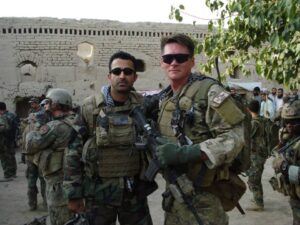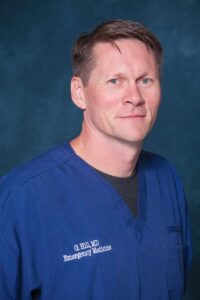Celebrating Veterans Day: Honoring USACS Physician, Guyon Hill, MD

Dr. Hill has been with USACS full-time for a little over a year and currently serves as the Ultrasound Director at Dell Children’s Medical Center in Austin, TX. Prior to his current role, Dr. Hill served as a physician in a variety of capacities with the Army and is a member of the United States Army Special Forces (Green Berets).
Joining the Army became a part of Dr. Hill’s story as he looked toward fulfilling his educational goals. Growing up in a single parent home, Dr. Hill knew attending college was not going to be in the cards unless he found alternative means to pursue the path. Motivated to find a way on his own, he elected to join the Reserve Officers’ Training Corps (ROTC) which provided him with the opportunity to complete his undergraduate studies. After graduating, Dr. Hill served as an Army Officer for a few years before making the decision to apply for medical school. Similar to his undergraduate path, Dr. Hill applied for a scholarship through the Army and was granted both the Army scholarship and a letter of acceptance from Tulane University School of Medicine.
While completing his medical degree, the unimaginable occurred—the devastating attacks of 9/11.
“It was an overwhelming time, and I felt a deep sense of guilt because the friends I made in the Army were being deployed and instead of being alongside them, I was in the midst of finishing my medical degree,” said Dr. Hill. “I never imagined war being at the center of all my years of service, but one thing I’ve learned through my journey with the Army is although you don’t get to choose what happens while you’re serving, you do become defined by the time in which you serve. My years served were challenging, but they helped shape me into the physician and person I am today.”
With the war overseas in full effect, Dr. Hill completed medical school and went on to complete his residency in emergency medicine at Brooke Army Medical Center (BAMC), the largest military hospital and the only Level 1 Trauma Center in the US Department of Defense (DoD). Once his residency training was completed in 2007, Dr. Hill was deployed four times in next three years as a physician directly in support of U.S. Army Special Forces. Following these deployments, Dr. Hill had the unique opportunity as a physician to attend Special Forces Assessment and Selection followed by the Special Forces Qualification Course.
“After working in the Special Forces and working alongside the best medics and soldiers in the field, I knew if the opportunity arose to become a Green Beret, I would take it,” said Dr. Hill.
The process of becoming a card-carrying member of the Green Berets is not for the faint of heart. It begins with a three-week special forces assessment and selection where each candidate is identified solely by a number, leveling the playing field for all who are attempting the feat. After successfully completing the selection process, the training to become a Green Beret begins. Dr. Hill completed the process in a year and a half and became the first physician since 1993 to make it through the pipeline to earn the title of Green Beret.
Unlike any other special operations forces, Green Berets have a language and cultural competency requirement to earn their esteemed title. There are multiple languages to be learned as Green Berets are leaned on to train, lead, and build rapport with foreign militaries and local populations in times of crisis. Green Berets are commonly known as “soldier-diplomats” given their distinct qualifications and ability to communicate.

Persevering through the challenges of becoming a Green Beret, Dr. Hill passed the training and, just four days after completion, was sent to Afghanistan to serve as the sole physician for the biggest Special Forces task force in history which included five provinces, 1,500 people, 50 medics, and 30 locations.
Throughout his years of service, Dr. Hill completed eight combat deployments and directly participated in over 150 combat missions. He received two bronze star medals for his actions in combat and earned several other combat and humanitarian awards. Although his Army career led to many lifelong achievements, experiences, and friendships, the hardships of war lingered. Rather than allowing the negative impacts of war turn him away from his desire to care for others, Dr. Hill used his experiences to modify his career path.
“I saw a lot of catastrophically injured children during my deployments, and it struck me that many of the children during these times of war had never been able to safely seek out medical care,” said Dr. Hill. “We began implementing trips to Kurdistan, a U.S. friendly territory, so we could take children to receive the medical care they needed. We figured if we could care for the children of these people, we could build trust and relationships as well.”
This experience served as the catalyst for Dr. Hill to pursue a path into a pediatric specialty upon his return home. Though he had anecdotal and unusual field experience, he spent two years getting clinically and academically prepared to become board-certified in pediatric emergency medicine as well as emergency medicine. In his current role at Dell Children’s, Dr. Hill has the opportunity to both practice and teach medicine thanks to the USACS pediatric emergency medicine fellowship program.
“During the course of my Army career, I was disproportionately exposed to a number of procedures that are much more commonly done in combat situations than in a civilian emergency department. That experience provides me with the ability to teach several high-risk, low prevalence procedures to our fellows,” said Dr. Hill. “From training Army medics and physicians to teaching our fellows here at Dell Children’s, I love being able to impart the skills I’ve gathered over the course of my career to help others feel confident they can handle any situation that comes their way. As Green Berets, we’re charged with being the best teachers in the Army, so I really lean into that role in all facets of my career.”
After 20 years of service, Dr. Hill officially retired from the Army last year. Although that chapter of his career has closed, his experiences will last him a lifetime and will translate in many ways into this next chapter of his career. Thus far, Dr. Hill is loving his work at Dell Children’s and is grateful for the outstanding leadership team.
“Everybody is super motivated and takes care of one another,” said Dr. Hill. “We have a great team which is something that is really important to me. I spent my entire Army career in the Special Forces arena because of the strong teamwork component and I like to surround myself with people who care and are invested. I’ve found this to be true with our leaders here at Dell Children’s and I am grateful for their support as I take on this new path in my career endeavors.”

